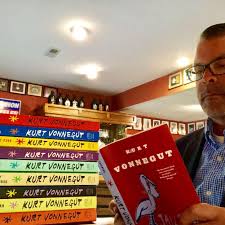The Timeless Works of Kurt Vonnegut
Kurt Vonnegut, an iconic American author known for his satirical and thought-provoking novels, has left an indelible mark on the literary world. With his unique blend of dark humour, social commentary, and science fiction elements, Vonnegut’s books continue to captivate readers of all ages.
One of Vonnegut’s most famous works is “Slaughterhouse-Five”, a novel that explores the horrors of war through the eyes of its protagonist, Billy Pilgrim. The book’s non-linear narrative and time-travelling elements challenge traditional storytelling conventions and offer a profound meditation on the nature of human existence.
Another beloved work by Vonnegut is “Cat’s Cradle”, a satirical novel that examines the destructive potential of science and technology. Through the character of Dr. Felix Hoenikker and his creation of a doomsday device known as Ice-Nine, Vonnegut raises important questions about humanity’s capacity for self-destruction.
Vonnegut’s wit and wisdom are also evident in “Breakfast of Champions”, a novel that blurs the line between fiction and reality as it follows the misadventures of author Kilgore Trout and car dealer Dwayne Hoover. Through its metafictional narrative and biting social commentary, the book offers a scathing critique of American society.
Whether you’re a longtime fan or new to Vonnegut’s work, exploring his books is a rewarding experience that will challenge your perceptions and provoke deep reflection. Dive into the world of Kurt Vonnegut today and discover why his timeless stories continue to resonate with readers around the world.
Six Insights into Kurt Vonnegut’s Literature: War, Wit, and Wisdom
- Explore themes of war, technology, and humanity in Vonnegut’s works.
- Pay attention to his unique writing style, which often includes dark humour and satire.
- Read ‘Slaughterhouse-Five’ for a powerful anti-war message and its innovative narrative structure.
- Consider the impact of historical events on Vonnegut’s storytelling, such as his experiences in World War II.
- Look out for recurring motifs like free will and the destruction of human values in his novels.
- Engage with Vonnegut’s critique of society and politics through his thought-provoking narratives.
Explore themes of war, technology, and humanity in Vonnegut’s works.
Delve into the rich tapestry of themes woven throughout Kurt Vonnegut’s literary masterpieces by exploring the intricate dynamics of war, technology, and humanity. Through his thought-provoking narratives, Vonnegut challenges readers to reflect on the devastating impact of war, the ethical implications of advancing technology, and the complex nature of human existence. By immersing yourself in these profound themes, you will gain a deeper understanding of Vonnegut’s insightful commentary on society and the human condition.
Pay attention to his unique writing style, which often includes dark humour and satire.
When delving into Kurt Vonnegut’s books, it is essential to pay close attention to his distinctive writing style, characterised by a blend of dark humour and satire. Vonnegut’s use of these elements adds depth and complexity to his narratives, offering readers a fresh perspective on the themes he explores. By immersing oneself in Vonnegut’s witty and satirical prose, one can truly appreciate the genius behind his storytelling and gain a deeper understanding of the social commentary woven throughout his works.
Read ‘Slaughterhouse-Five’ for a powerful anti-war message and its innovative narrative structure.
For a profound exploration of the devastating impact of war and a narrative that defies traditional storytelling conventions, delve into Kurt Vonnegut’s ‘Slaughterhouse-Five’. This iconic novel not only delivers a powerful anti-war message but also showcases Vonnegut’s innovative use of non-linear storytelling and time-travel elements. Through the eyes of protagonist Billy Pilgrim, readers are taken on a thought-provoking journey that challenges perceptions of time, reality, and the human experience. ‘Slaughterhouse-Five’ is a must-read for those seeking a gripping narrative with deep philosophical undertones.
Consider the impact of historical events on Vonnegut’s storytelling, such as his experiences in World War II.
Kurt Vonnegut’s storytelling is deeply influenced by his personal experiences, particularly his time serving in World War II. The impact of historical events, such as the bombing of Dresden which he witnessed as a prisoner of war, can be seen woven throughout his works. Vonnegut’s firsthand encounters with the devastation and absurdity of war not only shaped his perspective on humanity but also infused his writing with a raw authenticity that resonates with readers. By considering the profound influence of historical events on Vonnegut’s narratives, one gains a deeper appreciation for the depth and complexity of his storytelling.
Look out for recurring motifs like free will and the destruction of human values in his novels.
In Kurt Vonnegut’s novels, such as “Slaughterhouse-Five” and “Cat’s Cradle”, readers should pay close attention to recurring motifs that delve into profound themes like free will and the erosion of human values. Through his thought-provoking narratives, Vonnegut challenges conventional beliefs about personal agency and morality, inviting readers to contemplate the complexities of existence and society. By examining these recurring motifs across his body of work, readers can gain a deeper understanding of Vonnegut’s philosophical insights and the enduring relevance of his literary contributions.
Engage with Vonnegut’s critique of society and politics through his thought-provoking narratives.
Delve into Kurt Vonnegut’s compelling narratives to engage with his incisive critique of society and politics. Through thought-provoking storytelling, Vonnegut challenges readers to reflect on the complexities of human nature, societal norms, and political systems. By immersing yourself in his works, you can uncover layers of meaning that shed light on the pressing issues of our time, prompting introspection and sparking conversations about the world we live in.

